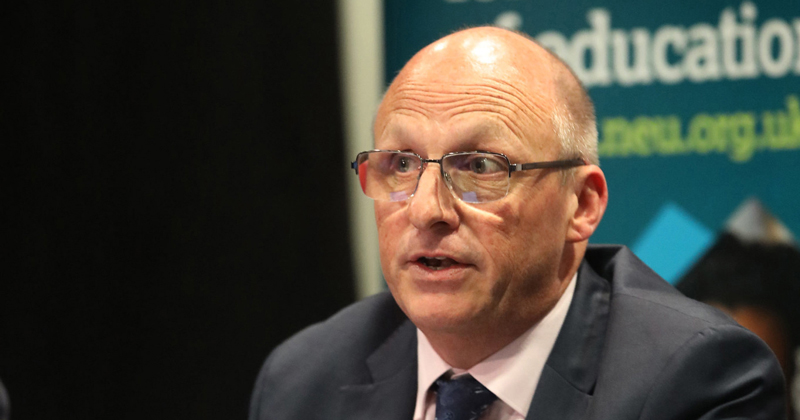Union leaders have blasted a “reckless” move by Ofsted to delay revealing its report card plan until September – leaving schools facing a “nonsensical” timeline for the roll-out of new inspections.
Ofsted had planned to publish its response to the consultation to reform inspections in the summer, before introducing the new inspections in November.
But the watchdog said today it will not be ready to publish its response until “early September”.
Ofsted had mulled delaying inspections, but has confirmed it will stick to its plan to roll out new report card inspections in November – leaving schools with potentially just weeks to prepare.
‘Schools need comprehensive understanding’
Education secretary Bridget Phillipson told Ofsted chief Sir Martyn Oliver in a letter the delay was “disappointing”.

She warned Oliver he must also “give education providers a comprehensive understanding of the new arrangements before they are introduced”, and ensure “in depth” training of the Ofsted workforce.
You can read Martyn Oliver’s full letter to Bridget Phillipson here. Phillipson’s letter in response is available in full here.
But Paul Whiteman, general secretary of school leaders’ union NAHT, said the delay will place “immense” pressure on schools. The announcement was “symptomatic of an organisation and a process in disarray”.

“This decision is bordering on reckless and could do real damage to the health and wellbeing of school staff,” he added.
Pepe D’Iasio, general secretary of the Association of School and College Leaders, added: “The introduction of a nonsensical inspection framework is now compounded by a nonsensical timetable.
“The idea that schools and colleges can prepare for a complete change in the inspection system on this scale in two months is, frankly, ridiculous.”
Steve Rollet, deputy chief executive of the Confederation of School Trusts, which represents more than 1,000 school trusts, said dropping the commitment to a term’s notice before implementation in schools “is a real concern”.
In its consultation document, Ofsted said its original timeline would ensure “a notice period equivalent to one term between the publication of our post-consultation response and inspection materials and the start of education inspections”.
This would allow the inspectorate to “ensure that providers and inspectors feel well prepared for the new inspections”.
Timeframe ‘cut in half’
But D’Iasio said the delay means the “already ambitious timeframe has now been cut in half”.
He said it would “make far more sense” to postpone the introduction of the new inspection system, and “even better” to start from scratch and create a new framework.

Daniel Kebede, general secretary of the National Education Union urged Ofsted to delay inspection reforms until September 2026 and to carry out a “proper consultation” to “get change right”.
“Martyn Oliver needs to slow down and be transparent about what the consultation has shown,” he added.
“Imposing a new model on the profession and failing to offer adequate time to digest what is now required, is simply unfair. With teacher and leader retention still at such challenging levels, this is reckless.”
Julia Waters, the sister of Caversham primary school headteacher Ruth Perry who took her own life following an Ofsted inspection, said Ofsted “must use the extra time to make significant changes to their plans”. “If not, it will have created the worst possible scenario: a bad inspection system, with even less time for schools and families to adapt to it.”
Delays ‘disappointing’, says Phillipson
Oliver informed Phillipson of the delay in a letter today.
He said Ofsted “fully intend to make improvements” to its proposed inspection framework, but they “need a little more time to complete our analysis of the responses we have received”.
The online consultation questionnaire received over 6,500 responses from parents, education professionals and representative bodies.
Oliver said Ofsted recognises it can “improve several aspects of our plans”, including bringing clarity to the new inspection “toolkits” and making definitions between grade boundaries clearer, “streamlining the number of evaluation areas”, and management and oversight of inspections.

He described the delay as “regrettable” but said he believes it will “result in a better and more effective inspection regime”.
After publishing its response in September, Ofsted said it will begin “a comprehensive training programme for inspectors and an extensive programme of engagement and preparation for those we inspect. This will allow us to introduce the revised framework in November as planned.”
But Phillipson was displeased, adding it was “important that Ofsted delivers to the expected timescales, to build confidence in the inspectorate and avoid additional challenges for headteachers and leaders”.
She noted Oliver’s “absolute commitment” to introduce the revised framework in November as planned.
New chair to bring ‘strong challenge’
Phillipson also used her letter to announce the appointment of former chief inspector Dame Christine Gilbert as the new Chair of Ofsted, as first revealed this morning by Schools Week.
Gilbert, who served as chief inspector of Ofsted between 2006 and 2011, last year led the independent review into the watchdog’s response to the death of headteacher Ruth Perry.
Her damning report, published in September, found Ofsted’s response to Perry’s suicide appeared “defensive and complacent”.
She also found the board’s role “appears curiously limited” and said the watchdog should review its governance framework to “strengthen the role of the board with the aim of establishing constructive challenge to support Ofsted in its learning and reform”.
Phillipson said on Wednesday Gilbert will help ensure the “successful delivery” of Ofsted’s reforms, “by bringing the strong challenge and support that all organisations need”.
















Your thoughts